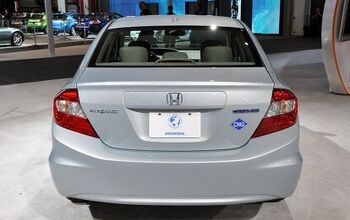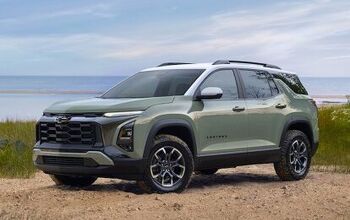Ask The Best And Brightest: Should Trucks Be Limited To The Right Lane?
As a telecommuter, I don’t drive as much as many Americans do, but I’ve come to the conclusion that lane discipline in this country (or at least in my part of it) is a huge problem. Traffic is frustrating in all circumstances, but unnecessary congestion caused by drivers who act without any apparent awareness of traffic around them is by far the most frustrating. And, in many cases, unnecessary congestion is caused by light-duty vehicles being held up by trucks, or slow-moving traffic clogging the left lane because of trucks passing in the middle lane.
Jalopnik takes on the issue of trucks in traffic with a piece entitled What you don’t know about the truck driver you just flipped off, which argues that truckers are overworked, overregulated and under financial pressure to deliver quickly. And though I sympathize with the plight of long-haul truckers, I don’t believe they should be allowed to leave the right lane.
The problems that the Jalopnik piece points out are issues endemic to a highly competitive industry: freight companies put pressure on their drivers to deliver on-time, even if they are held up in loading and limited to 68MPH. The argument then, is that because freight companies put impossible conditions on their drivers, the rest of traffic should feel honored to let the poor driver hold everyone else up while he passes a truck going two or three miles per hour slower than him. It’s a compelling argument if you look at it emotionally, but at the end of the day, doesn’t that sympathy just validate the abusive practices of the freight companies?
There’s a better way: in European countries, where trucks are strictly limited to the right lane, freeway traffic moves admirably (although some of that is due to the god-like lane discipline exercised by all drivers). Even in California, where the California Vehicle Code prevents trucks from leaving the right lane unless there are at least four lanes of traffic, the difference in interstate traffic caused by slowly passing trucks (compared to, say, Oregon) is distinctly noticeable. And if trucks are strictly forbidden from passing, the freight companies simply can not put unrealistic expectations on their drivers. And since, as the Jalopnik piece points out, experienced drivers are leaving the business at alarming rates, it’s clear that the industry needs to put less pressure on its employees anyway.
There are two ways to do this: one, require that all trucks stay in the right lane unless there are at least four lanes. Another: ban speed regulators that keep trucks under (say) 70 MPH, preventing trucks from needing to pass slower trucks as often. With both of these measures, freight firms wouldn’t be able to put unrealistic pressure on their drivers, trucks would no longer have to pass each other for an extra one or two MPH advantage, and the rest of traffic wouldn’t feel the need to flip off their hard-working fellow citizens. It sounds win-win to me… but what say you?
More by Edward Niedermeyer
Latest Car Reviews
Read moreLatest Product Reviews
Read moreRecent Comments
- El scotto Dale Carnegie had his grandkids do some upgrades?
- El scotto Work it backwards. How many people use Tesla Super Chargers: Primary Charging Point - this is my normal charging station; Secondary charging station - at a retail location or planned on trips, Rarely or Not at All.
- FreedMike Some clarification would make sense here: Tesla is laying off the team responsible for BUILDING NEW Supercharger stations. Apparently the ones already being built are going to be completed. The folks who maintain the current network are apparently unaffected. https://www.nytimes.com/2024/04/30/business/tesla-layoffs-supercharger-team.htmlAlso, many other other manufacturers are switching to NACS in the upcoming years, and some of those companies are already providing Supercharger adaptors for their non-NACS vehicles. Some Superchargers can already accomodate non-Tesla vehicles with a built in adaptor called the "magic dock."Given all this, my guess? They're trying to maximize utilization of the current system before building it out further.
- Dartman Damn Healey! You can only milk a cow so many times a day! Don’t worry though I bet Flex, 28, 1991, and all the usual suspects are just getting their fingers warmed up!
- FreedMike Your Ford AI instructor:

































Comments
Join the conversation
Parts of Idaho limit trucks to the right lane and a lower speed. It suited me just fine when I lived there.
No problem with trucks here. They use the left lane to pass me all the time! Not much congestion where I live.